Analysis of Management Principles in Wellton NHS Trust Case Study
VerifiedAdded on 2023/01/17
|14
|4351
|59
Case Study
AI Summary
This case study analyzes the management practices of Wellton NHS Trust, focusing on the application of scientific management principles, including the assessment of workforce personality and the utilization of social learning theory to improve employee behavior and performance. It examines the advantages and risks associated with personality assessments, and explores factors contributing to effective teamwork and the management of organizational changes within the medical records department. The study highlights the importance of employee benefits, training, and a positive work environment for fostering cooperation and reducing conflicts. Additionally, it discusses relevant behavioral theories and their application in motivating and guiding employee actions within the trust, aiming to enhance the quality of medical services provided to patients and improve overall organizational efficiency.
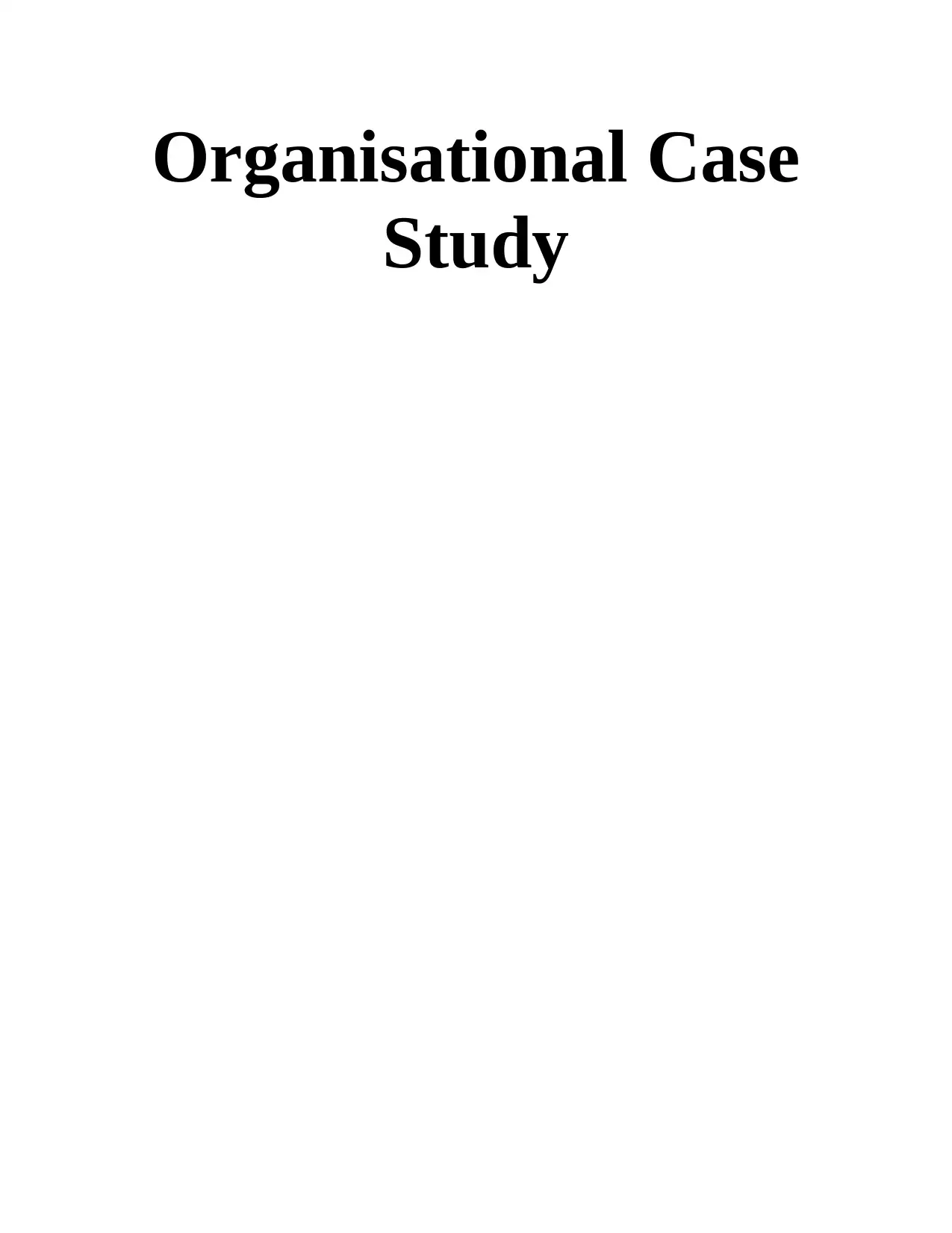
Organisational Case
Study
Study
Paraphrase This Document
Need a fresh take? Get an instant paraphrase of this document with our AI Paraphraser
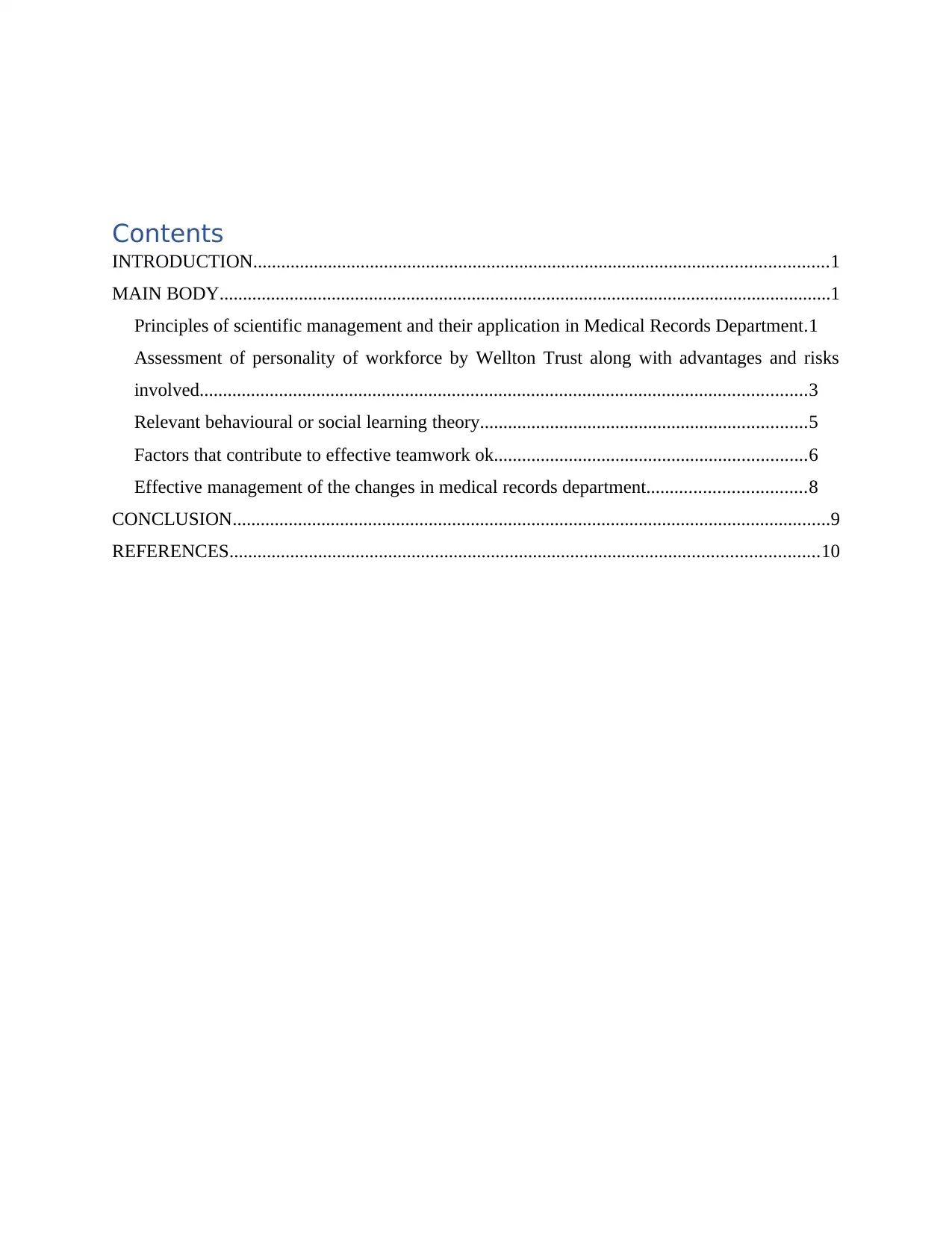
Contents
INTRODUCTION...........................................................................................................................1
MAIN BODY...................................................................................................................................1
Principles of scientific management and their application in Medical Records Department.1
Assessment of personality of workforce by Wellton Trust along with advantages and risks
involved..................................................................................................................................3
Relevant behavioural or social learning theory......................................................................5
Factors that contribute to effective teamwork ok...................................................................6
Effective management of the changes in medical records department..................................8
CONCLUSION................................................................................................................................9
REFERENCES..............................................................................................................................10
INTRODUCTION...........................................................................................................................1
MAIN BODY...................................................................................................................................1
Principles of scientific management and their application in Medical Records Department.1
Assessment of personality of workforce by Wellton Trust along with advantages and risks
involved..................................................................................................................................3
Relevant behavioural or social learning theory......................................................................5
Factors that contribute to effective teamwork ok...................................................................6
Effective management of the changes in medical records department..................................8
CONCLUSION................................................................................................................................9
REFERENCES..............................................................................................................................10
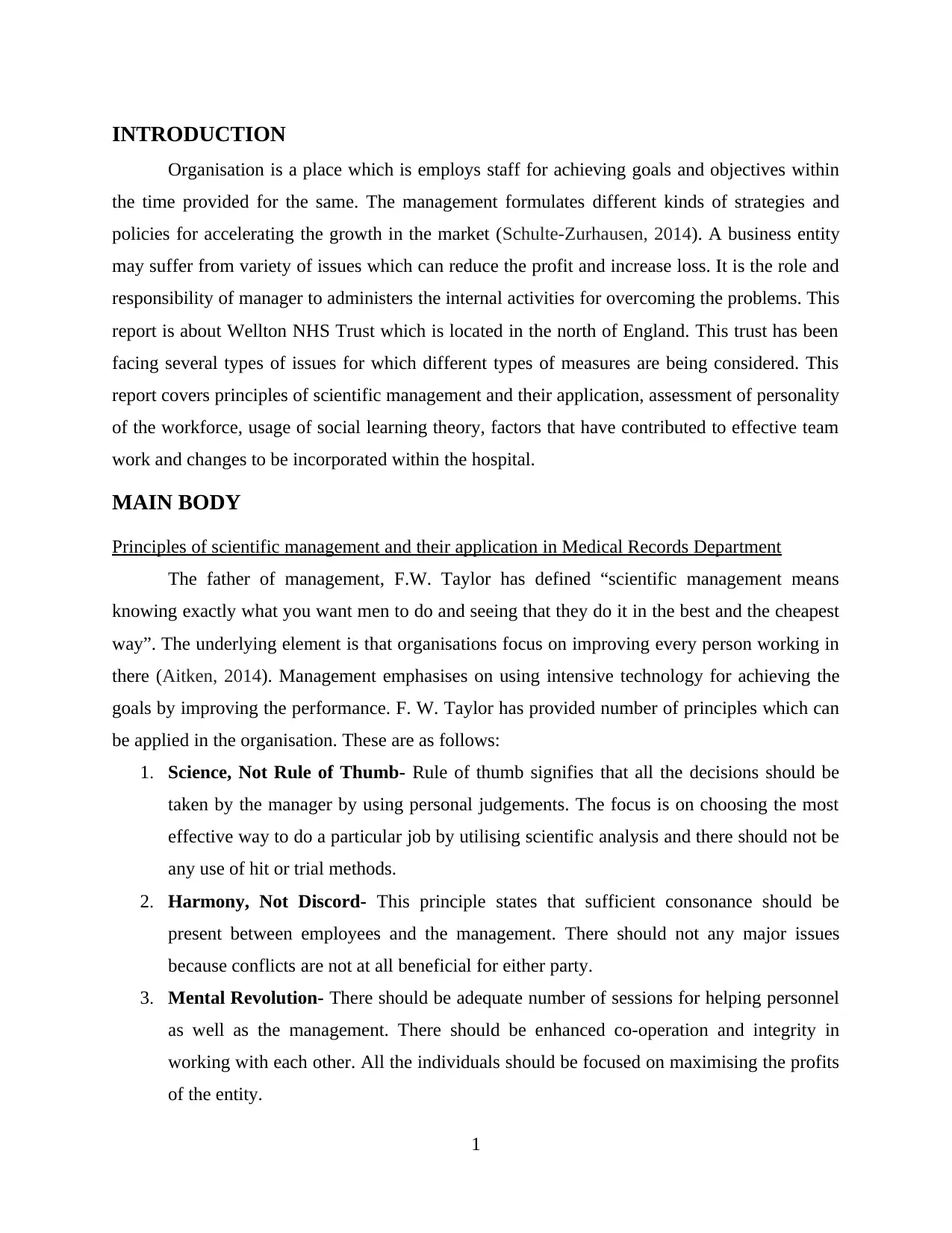
INTRODUCTION
Organisation is a place which is employs staff for achieving goals and objectives within
the time provided for the same. The management formulates different kinds of strategies and
policies for accelerating the growth in the market (Schulte-Zurhausen, 2014). A business entity
may suffer from variety of issues which can reduce the profit and increase loss. It is the role and
responsibility of manager to administers the internal activities for overcoming the problems. This
report is about Wellton NHS Trust which is located in the north of England. This trust has been
facing several types of issues for which different types of measures are being considered. This
report covers principles of scientific management and their application, assessment of personality
of the workforce, usage of social learning theory, factors that have contributed to effective team
work and changes to be incorporated within the hospital.
MAIN BODY
Principles of scientific management and their application in Medical Records Department
The father of management, F.W. Taylor has defined “scientific management means
knowing exactly what you want men to do and seeing that they do it in the best and the cheapest
way”. The underlying element is that organisations focus on improving every person working in
there (Aitken, 2014). Management emphasises on using intensive technology for achieving the
goals by improving the performance. F. W. Taylor has provided number of principles which can
be applied in the organisation. These are as follows:
1. Science, Not Rule of Thumb- Rule of thumb signifies that all the decisions should be
taken by the manager by using personal judgements. The focus is on choosing the most
effective way to do a particular job by utilising scientific analysis and there should not be
any use of hit or trial methods.
2. Harmony, Not Discord- This principle states that sufficient consonance should be
present between employees and the management. There should not any major issues
because conflicts are not at all beneficial for either party.
3. Mental Revolution- There should be adequate number of sessions for helping personnel
as well as the management. There should be enhanced co-operation and integrity in
working with each other. All the individuals should be focused on maximising the profits
of the entity.
1
Organisation is a place which is employs staff for achieving goals and objectives within
the time provided for the same. The management formulates different kinds of strategies and
policies for accelerating the growth in the market (Schulte-Zurhausen, 2014). A business entity
may suffer from variety of issues which can reduce the profit and increase loss. It is the role and
responsibility of manager to administers the internal activities for overcoming the problems. This
report is about Wellton NHS Trust which is located in the north of England. This trust has been
facing several types of issues for which different types of measures are being considered. This
report covers principles of scientific management and their application, assessment of personality
of the workforce, usage of social learning theory, factors that have contributed to effective team
work and changes to be incorporated within the hospital.
MAIN BODY
Principles of scientific management and their application in Medical Records Department
The father of management, F.W. Taylor has defined “scientific management means
knowing exactly what you want men to do and seeing that they do it in the best and the cheapest
way”. The underlying element is that organisations focus on improving every person working in
there (Aitken, 2014). Management emphasises on using intensive technology for achieving the
goals by improving the performance. F. W. Taylor has provided number of principles which can
be applied in the organisation. These are as follows:
1. Science, Not Rule of Thumb- Rule of thumb signifies that all the decisions should be
taken by the manager by using personal judgements. The focus is on choosing the most
effective way to do a particular job by utilising scientific analysis and there should not be
any use of hit or trial methods.
2. Harmony, Not Discord- This principle states that sufficient consonance should be
present between employees and the management. There should not any major issues
because conflicts are not at all beneficial for either party.
3. Mental Revolution- There should be adequate number of sessions for helping personnel
as well as the management. There should be enhanced co-operation and integrity in
working with each other. All the individuals should be focused on maximising the profits
of the entity.
1
⊘ This is a preview!⊘
Do you want full access?
Subscribe today to unlock all pages.

Trusted by 1+ million students worldwide
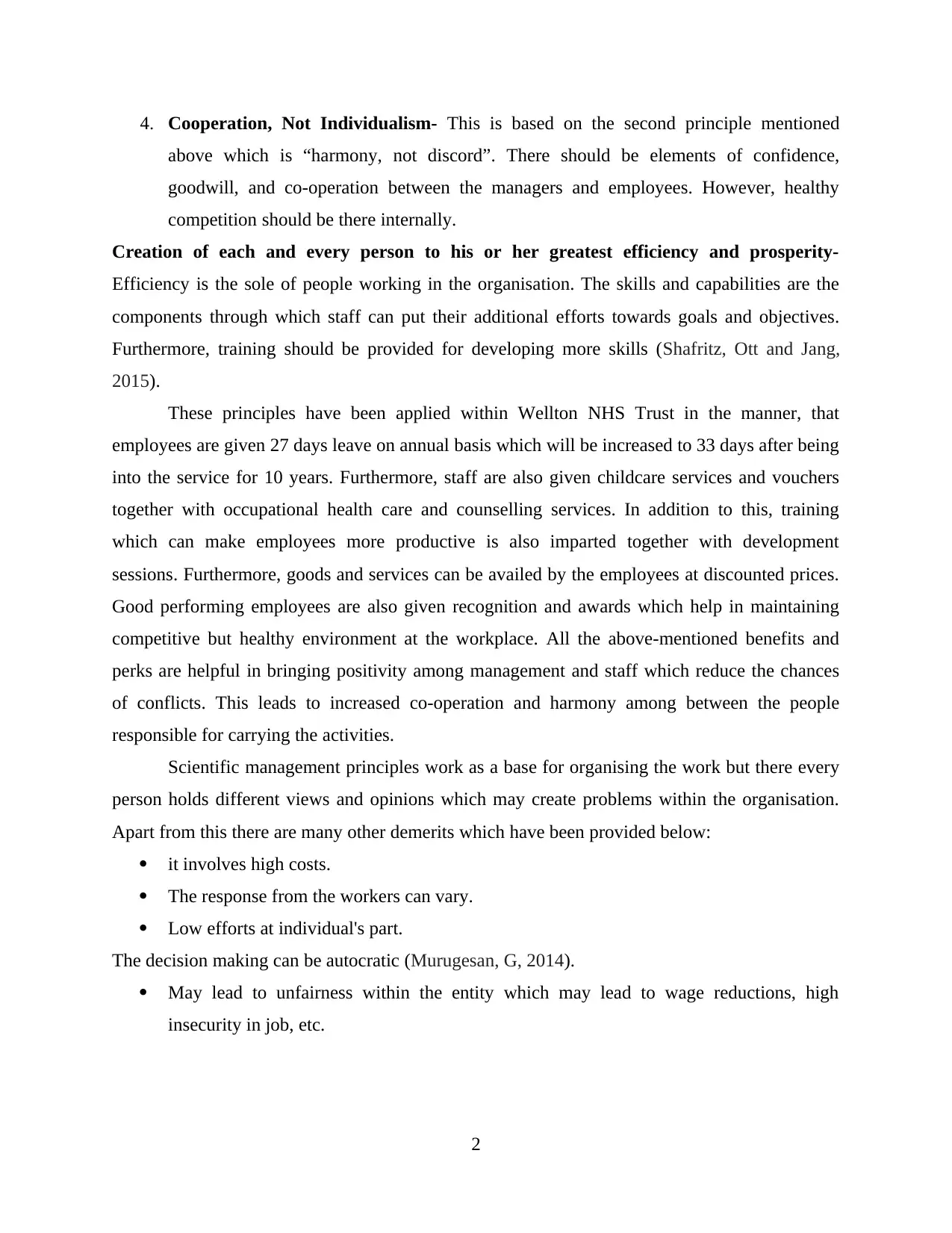
4. Cooperation, Not Individualism- This is based on the second principle mentioned
above which is “harmony, not discord”. There should be elements of confidence,
goodwill, and co-operation between the managers and employees. However, healthy
competition should be there internally.
Creation of each and every person to his or her greatest efficiency and prosperity-
Efficiency is the sole of people working in the organisation. The skills and capabilities are the
components through which staff can put their additional efforts towards goals and objectives.
Furthermore, training should be provided for developing more skills (Shafritz, Ott and Jang,
2015).
These principles have been applied within Wellton NHS Trust in the manner, that
employees are given 27 days leave on annual basis which will be increased to 33 days after being
into the service for 10 years. Furthermore, staff are also given childcare services and vouchers
together with occupational health care and counselling services. In addition to this, training
which can make employees more productive is also imparted together with development
sessions. Furthermore, goods and services can be availed by the employees at discounted prices.
Good performing employees are also given recognition and awards which help in maintaining
competitive but healthy environment at the workplace. All the above-mentioned benefits and
perks are helpful in bringing positivity among management and staff which reduce the chances
of conflicts. This leads to increased co-operation and harmony among between the people
responsible for carrying the activities.
Scientific management principles work as a base for organising the work but there every
person holds different views and opinions which may create problems within the organisation.
Apart from this there are many other demerits which have been provided below:
it involves high costs.
The response from the workers can vary.
Low efforts at individual's part.
The decision making can be autocratic (Murugesan, G, 2014).
May lead to unfairness within the entity which may lead to wage reductions, high
insecurity in job, etc.
2
above which is “harmony, not discord”. There should be elements of confidence,
goodwill, and co-operation between the managers and employees. However, healthy
competition should be there internally.
Creation of each and every person to his or her greatest efficiency and prosperity-
Efficiency is the sole of people working in the organisation. The skills and capabilities are the
components through which staff can put their additional efforts towards goals and objectives.
Furthermore, training should be provided for developing more skills (Shafritz, Ott and Jang,
2015).
These principles have been applied within Wellton NHS Trust in the manner, that
employees are given 27 days leave on annual basis which will be increased to 33 days after being
into the service for 10 years. Furthermore, staff are also given childcare services and vouchers
together with occupational health care and counselling services. In addition to this, training
which can make employees more productive is also imparted together with development
sessions. Furthermore, goods and services can be availed by the employees at discounted prices.
Good performing employees are also given recognition and awards which help in maintaining
competitive but healthy environment at the workplace. All the above-mentioned benefits and
perks are helpful in bringing positivity among management and staff which reduce the chances
of conflicts. This leads to increased co-operation and harmony among between the people
responsible for carrying the activities.
Scientific management principles work as a base for organising the work but there every
person holds different views and opinions which may create problems within the organisation.
Apart from this there are many other demerits which have been provided below:
it involves high costs.
The response from the workers can vary.
Low efforts at individual's part.
The decision making can be autocratic (Murugesan, G, 2014).
May lead to unfairness within the entity which may lead to wage reductions, high
insecurity in job, etc.
2
Paraphrase This Document
Need a fresh take? Get an instant paraphrase of this document with our AI Paraphraser
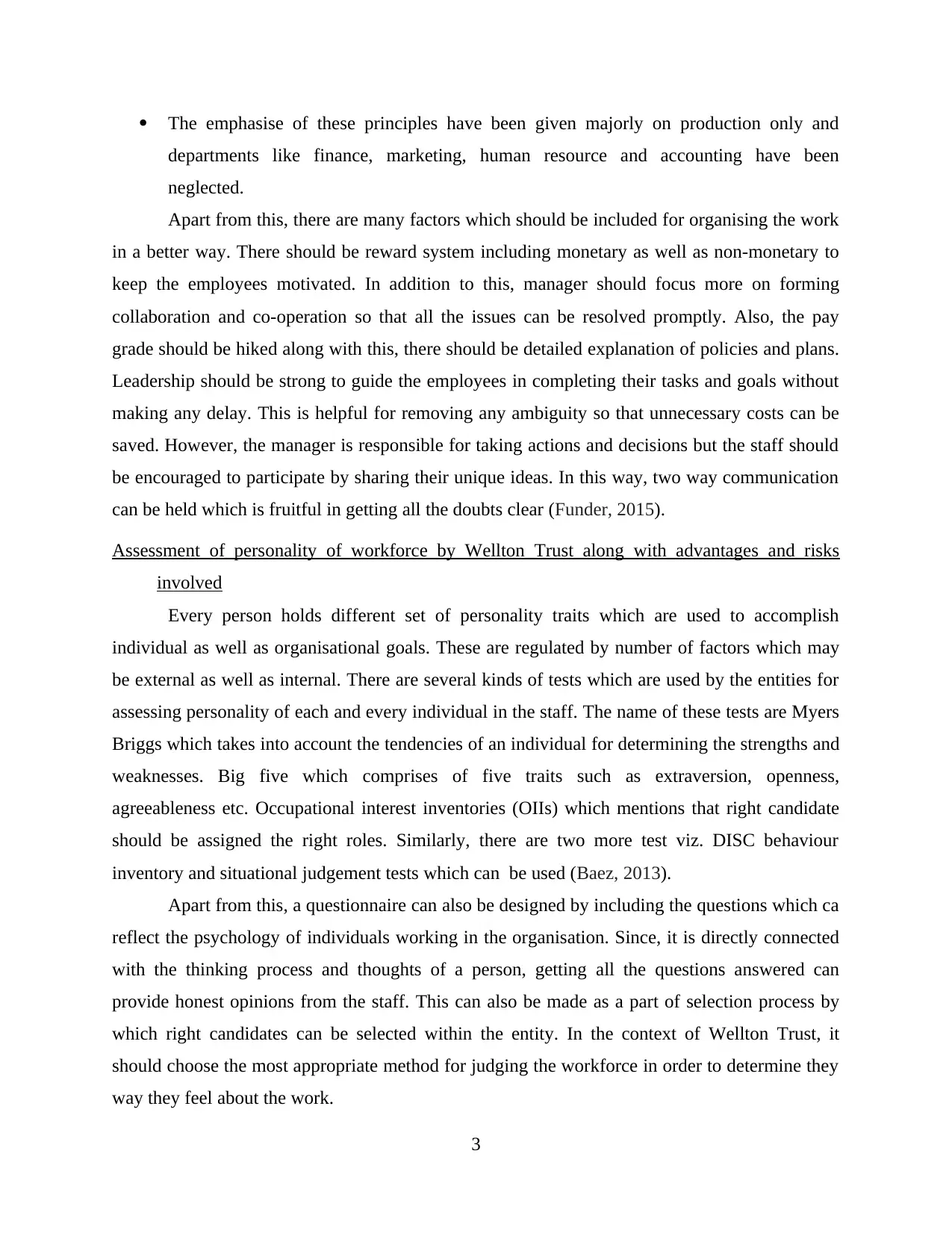
The emphasise of these principles have been given majorly on production only and
departments like finance, marketing, human resource and accounting have been
neglected.
Apart from this, there are many factors which should be included for organising the work
in a better way. There should be reward system including monetary as well as non-monetary to
keep the employees motivated. In addition to this, manager should focus more on forming
collaboration and co-operation so that all the issues can be resolved promptly. Also, the pay
grade should be hiked along with this, there should be detailed explanation of policies and plans.
Leadership should be strong to guide the employees in completing their tasks and goals without
making any delay. This is helpful for removing any ambiguity so that unnecessary costs can be
saved. However, the manager is responsible for taking actions and decisions but the staff should
be encouraged to participate by sharing their unique ideas. In this way, two way communication
can be held which is fruitful in getting all the doubts clear (Funder, 2015).
Assessment of personality of workforce by Wellton Trust along with advantages and risks
involved
Every person holds different set of personality traits which are used to accomplish
individual as well as organisational goals. These are regulated by number of factors which may
be external as well as internal. There are several kinds of tests which are used by the entities for
assessing personality of each and every individual in the staff. The name of these tests are Myers
Briggs which takes into account the tendencies of an individual for determining the strengths and
weaknesses. Big five which comprises of five traits such as extraversion, openness,
agreeableness etc. Occupational interest inventories (OIIs) which mentions that right candidate
should be assigned the right roles. Similarly, there are two more test viz. DISC behaviour
inventory and situational judgement tests which can be used (Baez, 2013).
Apart from this, a questionnaire can also be designed by including the questions which ca
reflect the psychology of individuals working in the organisation. Since, it is directly connected
with the thinking process and thoughts of a person, getting all the questions answered can
provide honest opinions from the staff. This can also be made as a part of selection process by
which right candidates can be selected within the entity. In the context of Wellton Trust, it
should choose the most appropriate method for judging the workforce in order to determine they
way they feel about the work.
3
departments like finance, marketing, human resource and accounting have been
neglected.
Apart from this, there are many factors which should be included for organising the work
in a better way. There should be reward system including monetary as well as non-monetary to
keep the employees motivated. In addition to this, manager should focus more on forming
collaboration and co-operation so that all the issues can be resolved promptly. Also, the pay
grade should be hiked along with this, there should be detailed explanation of policies and plans.
Leadership should be strong to guide the employees in completing their tasks and goals without
making any delay. This is helpful for removing any ambiguity so that unnecessary costs can be
saved. However, the manager is responsible for taking actions and decisions but the staff should
be encouraged to participate by sharing their unique ideas. In this way, two way communication
can be held which is fruitful in getting all the doubts clear (Funder, 2015).
Assessment of personality of workforce by Wellton Trust along with advantages and risks
involved
Every person holds different set of personality traits which are used to accomplish
individual as well as organisational goals. These are regulated by number of factors which may
be external as well as internal. There are several kinds of tests which are used by the entities for
assessing personality of each and every individual in the staff. The name of these tests are Myers
Briggs which takes into account the tendencies of an individual for determining the strengths and
weaknesses. Big five which comprises of five traits such as extraversion, openness,
agreeableness etc. Occupational interest inventories (OIIs) which mentions that right candidate
should be assigned the right roles. Similarly, there are two more test viz. DISC behaviour
inventory and situational judgement tests which can be used (Baez, 2013).
Apart from this, a questionnaire can also be designed by including the questions which ca
reflect the psychology of individuals working in the organisation. Since, it is directly connected
with the thinking process and thoughts of a person, getting all the questions answered can
provide honest opinions from the staff. This can also be made as a part of selection process by
which right candidates can be selected within the entity. In the context of Wellton Trust, it
should choose the most appropriate method for judging the workforce in order to determine they
way they feel about the work.
3
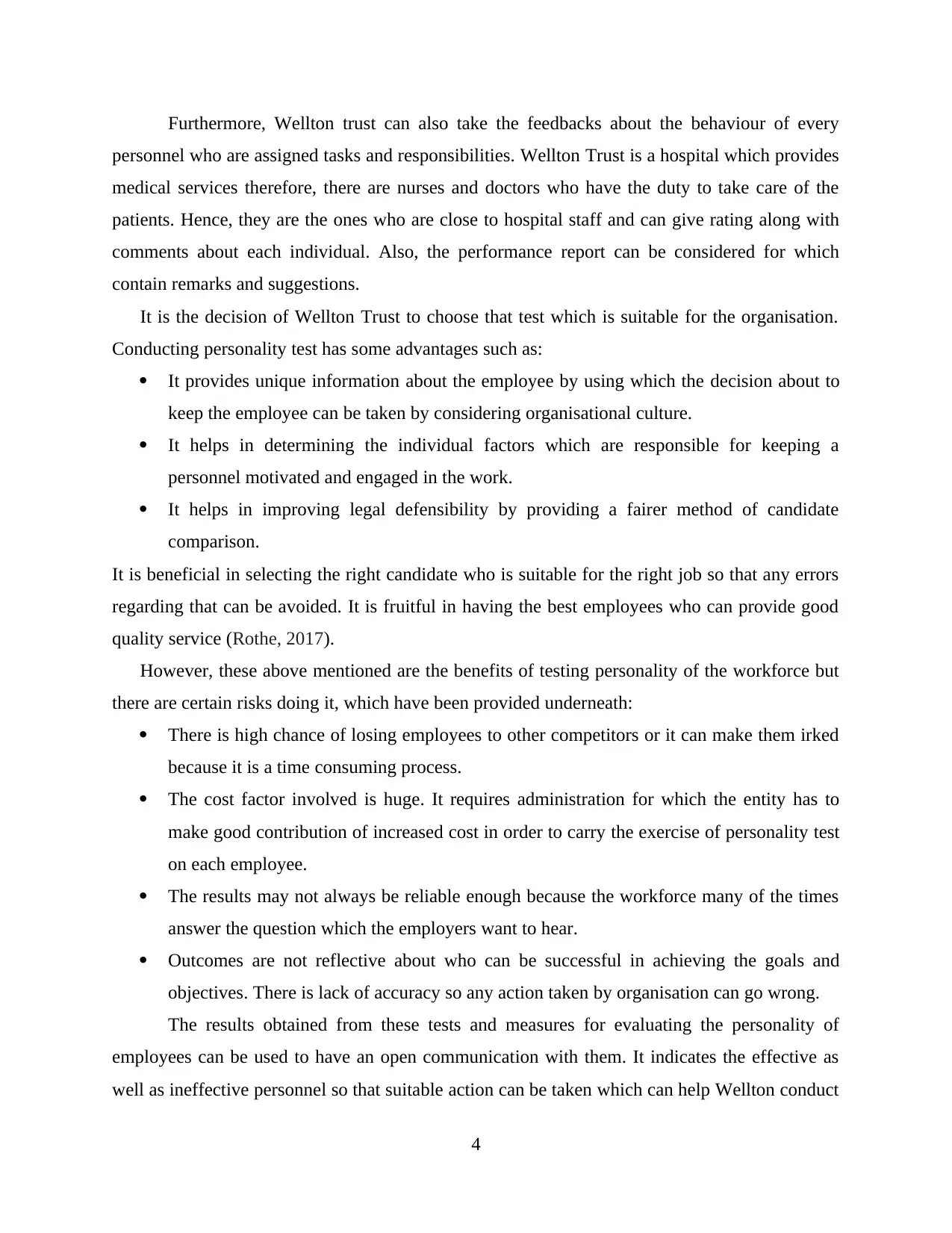
Furthermore, Wellton trust can also take the feedbacks about the behaviour of every
personnel who are assigned tasks and responsibilities. Wellton Trust is a hospital which provides
medical services therefore, there are nurses and doctors who have the duty to take care of the
patients. Hence, they are the ones who are close to hospital staff and can give rating along with
comments about each individual. Also, the performance report can be considered for which
contain remarks and suggestions.
It is the decision of Wellton Trust to choose that test which is suitable for the organisation.
Conducting personality test has some advantages such as:
It provides unique information about the employee by using which the decision about to
keep the employee can be taken by considering organisational culture.
It helps in determining the individual factors which are responsible for keeping a
personnel motivated and engaged in the work.
It helps in improving legal defensibility by providing a fairer method of candidate
comparison.
It is beneficial in selecting the right candidate who is suitable for the right job so that any errors
regarding that can be avoided. It is fruitful in having the best employees who can provide good
quality service (Rothe, 2017).
However, these above mentioned are the benefits of testing personality of the workforce but
there are certain risks doing it, which have been provided underneath:
There is high chance of losing employees to other competitors or it can make them irked
because it is a time consuming process.
The cost factor involved is huge. It requires administration for which the entity has to
make good contribution of increased cost in order to carry the exercise of personality test
on each employee.
The results may not always be reliable enough because the workforce many of the times
answer the question which the employers want to hear.
Outcomes are not reflective about who can be successful in achieving the goals and
objectives. There is lack of accuracy so any action taken by organisation can go wrong.
The results obtained from these tests and measures for evaluating the personality of
employees can be used to have an open communication with them. It indicates the effective as
well as ineffective personnel so that suitable action can be taken which can help Wellton conduct
4
personnel who are assigned tasks and responsibilities. Wellton Trust is a hospital which provides
medical services therefore, there are nurses and doctors who have the duty to take care of the
patients. Hence, they are the ones who are close to hospital staff and can give rating along with
comments about each individual. Also, the performance report can be considered for which
contain remarks and suggestions.
It is the decision of Wellton Trust to choose that test which is suitable for the organisation.
Conducting personality test has some advantages such as:
It provides unique information about the employee by using which the decision about to
keep the employee can be taken by considering organisational culture.
It helps in determining the individual factors which are responsible for keeping a
personnel motivated and engaged in the work.
It helps in improving legal defensibility by providing a fairer method of candidate
comparison.
It is beneficial in selecting the right candidate who is suitable for the right job so that any errors
regarding that can be avoided. It is fruitful in having the best employees who can provide good
quality service (Rothe, 2017).
However, these above mentioned are the benefits of testing personality of the workforce but
there are certain risks doing it, which have been provided underneath:
There is high chance of losing employees to other competitors or it can make them irked
because it is a time consuming process.
The cost factor involved is huge. It requires administration for which the entity has to
make good contribution of increased cost in order to carry the exercise of personality test
on each employee.
The results may not always be reliable enough because the workforce many of the times
answer the question which the employers want to hear.
Outcomes are not reflective about who can be successful in achieving the goals and
objectives. There is lack of accuracy so any action taken by organisation can go wrong.
The results obtained from these tests and measures for evaluating the personality of
employees can be used to have an open communication with them. It indicates the effective as
well as ineffective personnel so that suitable action can be taken which can help Wellton conduct
4
⊘ This is a preview!⊘
Do you want full access?
Subscribe today to unlock all pages.

Trusted by 1+ million students worldwide
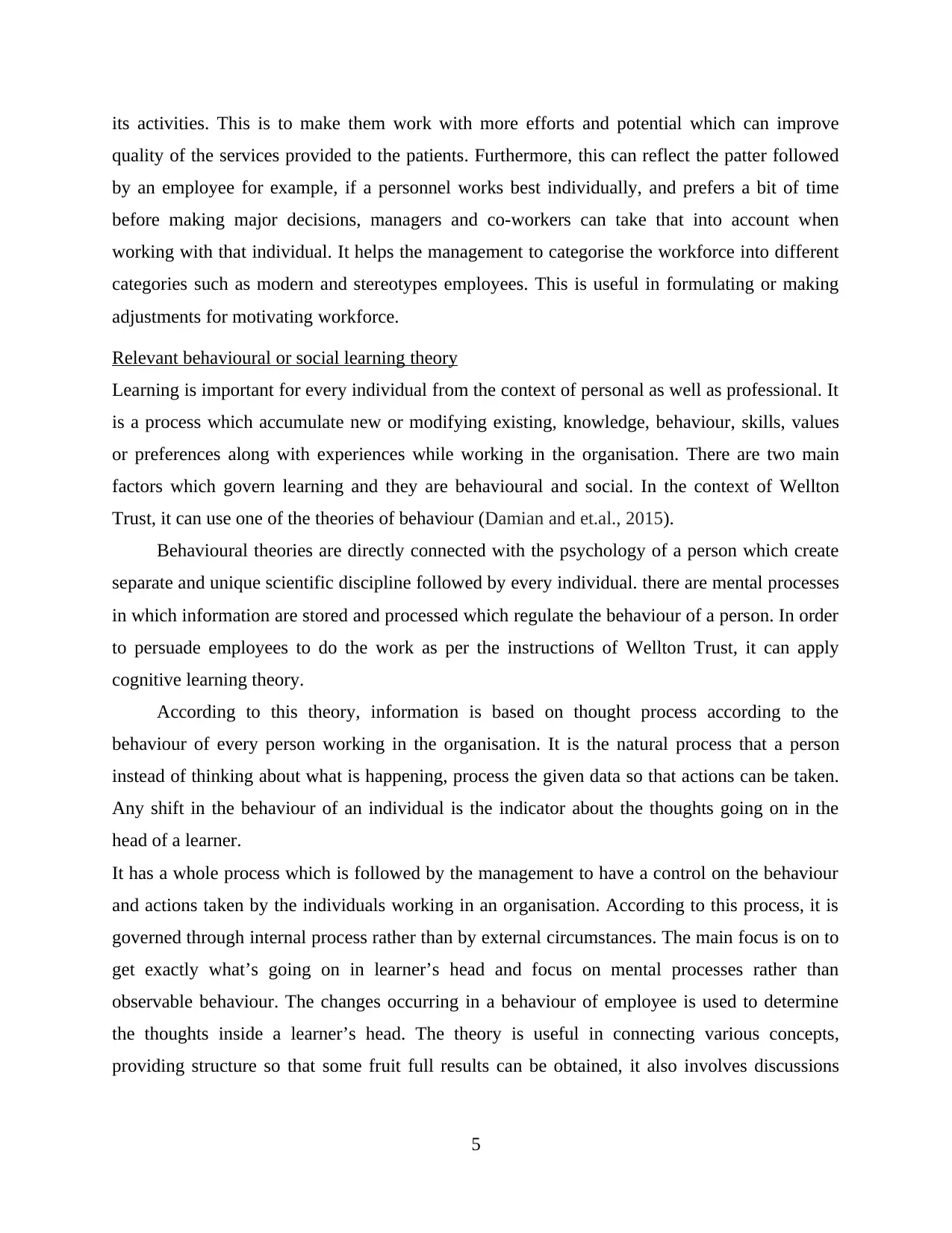
its activities. This is to make them work with more efforts and potential which can improve
quality of the services provided to the patients. Furthermore, this can reflect the patter followed
by an employee for example, if a personnel works best individually, and prefers a bit of time
before making major decisions, managers and co-workers can take that into account when
working with that individual. It helps the management to categorise the workforce into different
categories such as modern and stereotypes employees. This is useful in formulating or making
adjustments for motivating workforce.
Relevant behavioural or social learning theory
Learning is important for every individual from the context of personal as well as professional. It
is a process which accumulate new or modifying existing, knowledge, behaviour, skills, values
or preferences along with experiences while working in the organisation. There are two main
factors which govern learning and they are behavioural and social. In the context of Wellton
Trust, it can use one of the theories of behaviour (Damian and et.al., 2015).
Behavioural theories are directly connected with the psychology of a person which create
separate and unique scientific discipline followed by every individual. there are mental processes
in which information are stored and processed which regulate the behaviour of a person. In order
to persuade employees to do the work as per the instructions of Wellton Trust, it can apply
cognitive learning theory.
According to this theory, information is based on thought process according to the
behaviour of every person working in the organisation. It is the natural process that a person
instead of thinking about what is happening, process the given data so that actions can be taken.
Any shift in the behaviour of an individual is the indicator about the thoughts going on in the
head of a learner.
It has a whole process which is followed by the management to have a control on the behaviour
and actions taken by the individuals working in an organisation. According to this process, it is
governed through internal process rather than by external circumstances. The main focus is on to
get exactly what’s going on in learner’s head and focus on mental processes rather than
observable behaviour. The changes occurring in a behaviour of employee is used to determine
the thoughts inside a learner’s head. The theory is useful in connecting various concepts,
providing structure so that some fruit full results can be obtained, it also involves discussions
5
quality of the services provided to the patients. Furthermore, this can reflect the patter followed
by an employee for example, if a personnel works best individually, and prefers a bit of time
before making major decisions, managers and co-workers can take that into account when
working with that individual. It helps the management to categorise the workforce into different
categories such as modern and stereotypes employees. This is useful in formulating or making
adjustments for motivating workforce.
Relevant behavioural or social learning theory
Learning is important for every individual from the context of personal as well as professional. It
is a process which accumulate new or modifying existing, knowledge, behaviour, skills, values
or preferences along with experiences while working in the organisation. There are two main
factors which govern learning and they are behavioural and social. In the context of Wellton
Trust, it can use one of the theories of behaviour (Damian and et.al., 2015).
Behavioural theories are directly connected with the psychology of a person which create
separate and unique scientific discipline followed by every individual. there are mental processes
in which information are stored and processed which regulate the behaviour of a person. In order
to persuade employees to do the work as per the instructions of Wellton Trust, it can apply
cognitive learning theory.
According to this theory, information is based on thought process according to the
behaviour of every person working in the organisation. It is the natural process that a person
instead of thinking about what is happening, process the given data so that actions can be taken.
Any shift in the behaviour of an individual is the indicator about the thoughts going on in the
head of a learner.
It has a whole process which is followed by the management to have a control on the behaviour
and actions taken by the individuals working in an organisation. According to this process, it is
governed through internal process rather than by external circumstances. The main focus is on to
get exactly what’s going on in learner’s head and focus on mental processes rather than
observable behaviour. The changes occurring in a behaviour of employee is used to determine
the thoughts inside a learner’s head. The theory is useful in connecting various concepts,
providing structure so that some fruit full results can be obtained, it also involves discussions
5
Paraphrase This Document
Need a fresh take? Get an instant paraphrase of this document with our AI Paraphraser
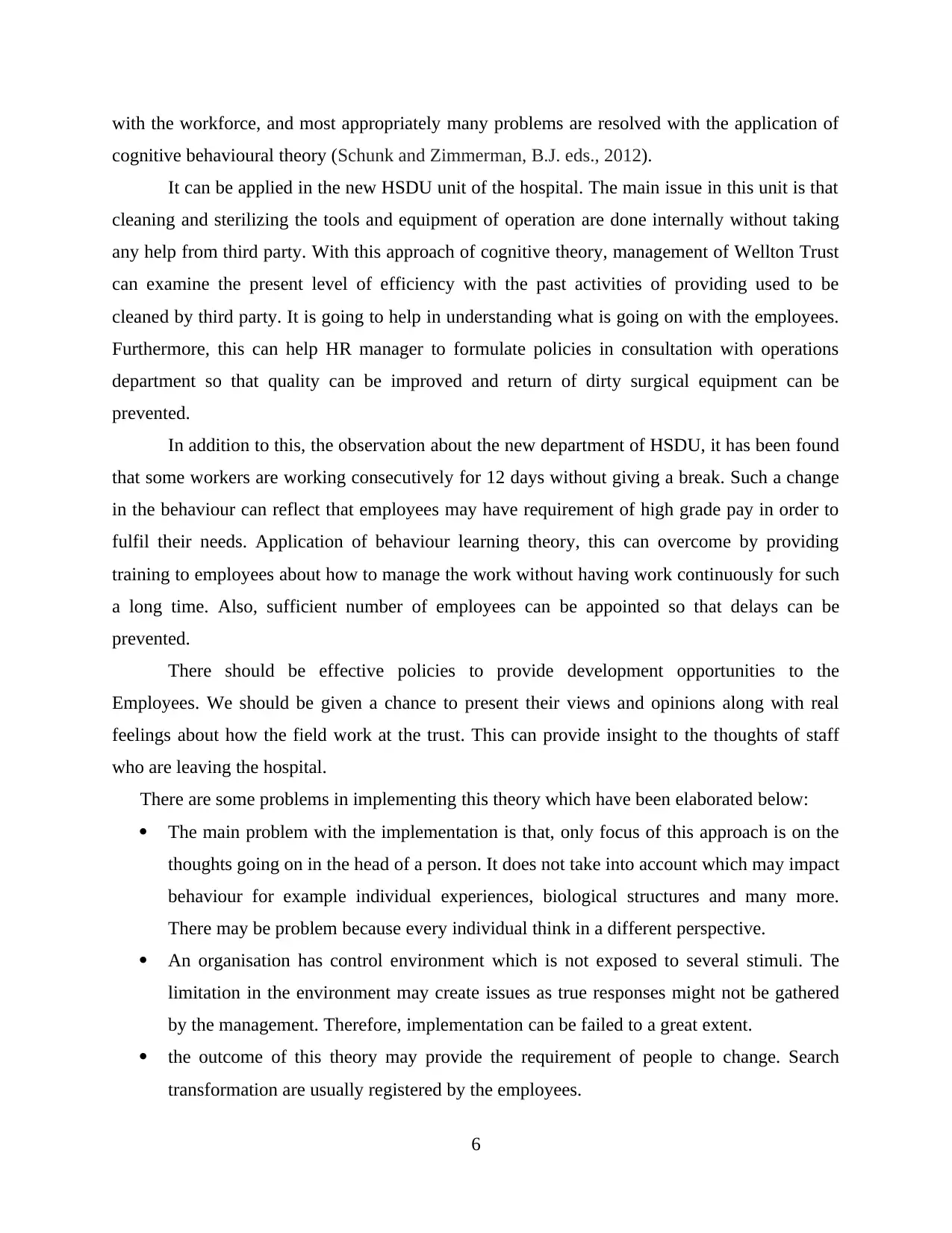
with the workforce, and most appropriately many problems are resolved with the application of
cognitive behavioural theory (Schunk and Zimmerman, B.J. eds., 2012).
It can be applied in the new HSDU unit of the hospital. The main issue in this unit is that
cleaning and sterilizing the tools and equipment of operation are done internally without taking
any help from third party. With this approach of cognitive theory, management of Wellton Trust
can examine the present level of efficiency with the past activities of providing used to be
cleaned by third party. It is going to help in understanding what is going on with the employees.
Furthermore, this can help HR manager to formulate policies in consultation with operations
department so that quality can be improved and return of dirty surgical equipment can be
prevented.
In addition to this, the observation about the new department of HSDU, it has been found
that some workers are working consecutively for 12 days without giving a break. Such a change
in the behaviour can reflect that employees may have requirement of high grade pay in order to
fulfil their needs. Application of behaviour learning theory, this can overcome by providing
training to employees about how to manage the work without having work continuously for such
a long time. Also, sufficient number of employees can be appointed so that delays can be
prevented.
There should be effective policies to provide development opportunities to the
Employees. We should be given a chance to present their views and opinions along with real
feelings about how the field work at the trust. This can provide insight to the thoughts of staff
who are leaving the hospital.
There are some problems in implementing this theory which have been elaborated below:
The main problem with the implementation is that, only focus of this approach is on the
thoughts going on in the head of a person. It does not take into account which may impact
behaviour for example individual experiences, biological structures and many more.
There may be problem because every individual think in a different perspective.
An organisation has control environment which is not exposed to several stimuli. The
limitation in the environment may create issues as true responses might not be gathered
by the management. Therefore, implementation can be failed to a great extent.
the outcome of this theory may provide the requirement of people to change. Search
transformation are usually registered by the employees.
6
cognitive behavioural theory (Schunk and Zimmerman, B.J. eds., 2012).
It can be applied in the new HSDU unit of the hospital. The main issue in this unit is that
cleaning and sterilizing the tools and equipment of operation are done internally without taking
any help from third party. With this approach of cognitive theory, management of Wellton Trust
can examine the present level of efficiency with the past activities of providing used to be
cleaned by third party. It is going to help in understanding what is going on with the employees.
Furthermore, this can help HR manager to formulate policies in consultation with operations
department so that quality can be improved and return of dirty surgical equipment can be
prevented.
In addition to this, the observation about the new department of HSDU, it has been found
that some workers are working consecutively for 12 days without giving a break. Such a change
in the behaviour can reflect that employees may have requirement of high grade pay in order to
fulfil their needs. Application of behaviour learning theory, this can overcome by providing
training to employees about how to manage the work without having work continuously for such
a long time. Also, sufficient number of employees can be appointed so that delays can be
prevented.
There should be effective policies to provide development opportunities to the
Employees. We should be given a chance to present their views and opinions along with real
feelings about how the field work at the trust. This can provide insight to the thoughts of staff
who are leaving the hospital.
There are some problems in implementing this theory which have been elaborated below:
The main problem with the implementation is that, only focus of this approach is on the
thoughts going on in the head of a person. It does not take into account which may impact
behaviour for example individual experiences, biological structures and many more.
There may be problem because every individual think in a different perspective.
An organisation has control environment which is not exposed to several stimuli. The
limitation in the environment may create issues as true responses might not be gathered
by the management. Therefore, implementation can be failed to a great extent.
the outcome of this theory may provide the requirement of people to change. Search
transformation are usually registered by the employees.
6
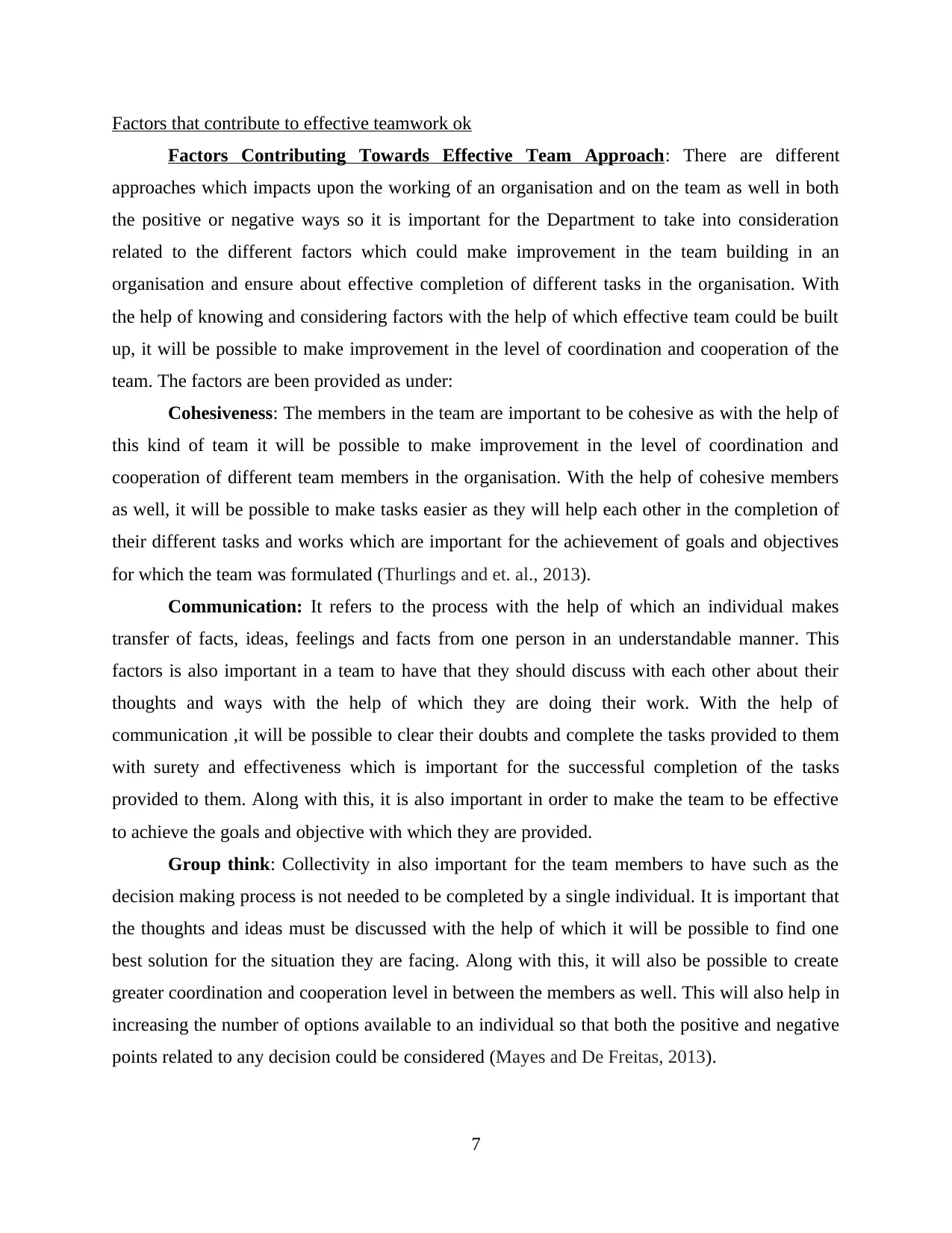
Factors that contribute to effective teamwork ok
Factors Contributing Towards Effective Team Approach: There are different
approaches which impacts upon the working of an organisation and on the team as well in both
the positive or negative ways so it is important for the Department to take into consideration
related to the different factors which could make improvement in the team building in an
organisation and ensure about effective completion of different tasks in the organisation. With
the help of knowing and considering factors with the help of which effective team could be built
up, it will be possible to make improvement in the level of coordination and cooperation of the
team. The factors are been provided as under:
Cohesiveness: The members in the team are important to be cohesive as with the help of
this kind of team it will be possible to make improvement in the level of coordination and
cooperation of different team members in the organisation. With the help of cohesive members
as well, it will be possible to make tasks easier as they will help each other in the completion of
their different tasks and works which are important for the achievement of goals and objectives
for which the team was formulated (Thurlings and et. al., 2013).
Communication: It refers to the process with the help of which an individual makes
transfer of facts, ideas, feelings and facts from one person in an understandable manner. This
factors is also important in a team to have that they should discuss with each other about their
thoughts and ways with the help of which they are doing their work. With the help of
communication ,it will be possible to clear their doubts and complete the tasks provided to them
with surety and effectiveness which is important for the successful completion of the tasks
provided to them. Along with this, it is also important in order to make the team to be effective
to achieve the goals and objective with which they are provided.
Group think: Collectivity in also important for the team members to have such as the
decision making process is not needed to be completed by a single individual. It is important that
the thoughts and ideas must be discussed with the help of which it will be possible to find one
best solution for the situation they are facing. Along with this, it will also be possible to create
greater coordination and cooperation level in between the members as well. This will also help in
increasing the number of options available to an individual so that both the positive and negative
points related to any decision could be considered (Mayes and De Freitas, 2013).
7
Factors Contributing Towards Effective Team Approach: There are different
approaches which impacts upon the working of an organisation and on the team as well in both
the positive or negative ways so it is important for the Department to take into consideration
related to the different factors which could make improvement in the team building in an
organisation and ensure about effective completion of different tasks in the organisation. With
the help of knowing and considering factors with the help of which effective team could be built
up, it will be possible to make improvement in the level of coordination and cooperation of the
team. The factors are been provided as under:
Cohesiveness: The members in the team are important to be cohesive as with the help of
this kind of team it will be possible to make improvement in the level of coordination and
cooperation of different team members in the organisation. With the help of cohesive members
as well, it will be possible to make tasks easier as they will help each other in the completion of
their different tasks and works which are important for the achievement of goals and objectives
for which the team was formulated (Thurlings and et. al., 2013).
Communication: It refers to the process with the help of which an individual makes
transfer of facts, ideas, feelings and facts from one person in an understandable manner. This
factors is also important in a team to have that they should discuss with each other about their
thoughts and ways with the help of which they are doing their work. With the help of
communication ,it will be possible to clear their doubts and complete the tasks provided to them
with surety and effectiveness which is important for the successful completion of the tasks
provided to them. Along with this, it is also important in order to make the team to be effective
to achieve the goals and objective with which they are provided.
Group think: Collectivity in also important for the team members to have such as the
decision making process is not needed to be completed by a single individual. It is important that
the thoughts and ideas must be discussed with the help of which it will be possible to find one
best solution for the situation they are facing. Along with this, it will also be possible to create
greater coordination and cooperation level in between the members as well. This will also help in
increasing the number of options available to an individual so that both the positive and negative
points related to any decision could be considered (Mayes and De Freitas, 2013).
7
⊘ This is a preview!⊘
Do you want full access?
Subscribe today to unlock all pages.

Trusted by 1+ million students worldwide
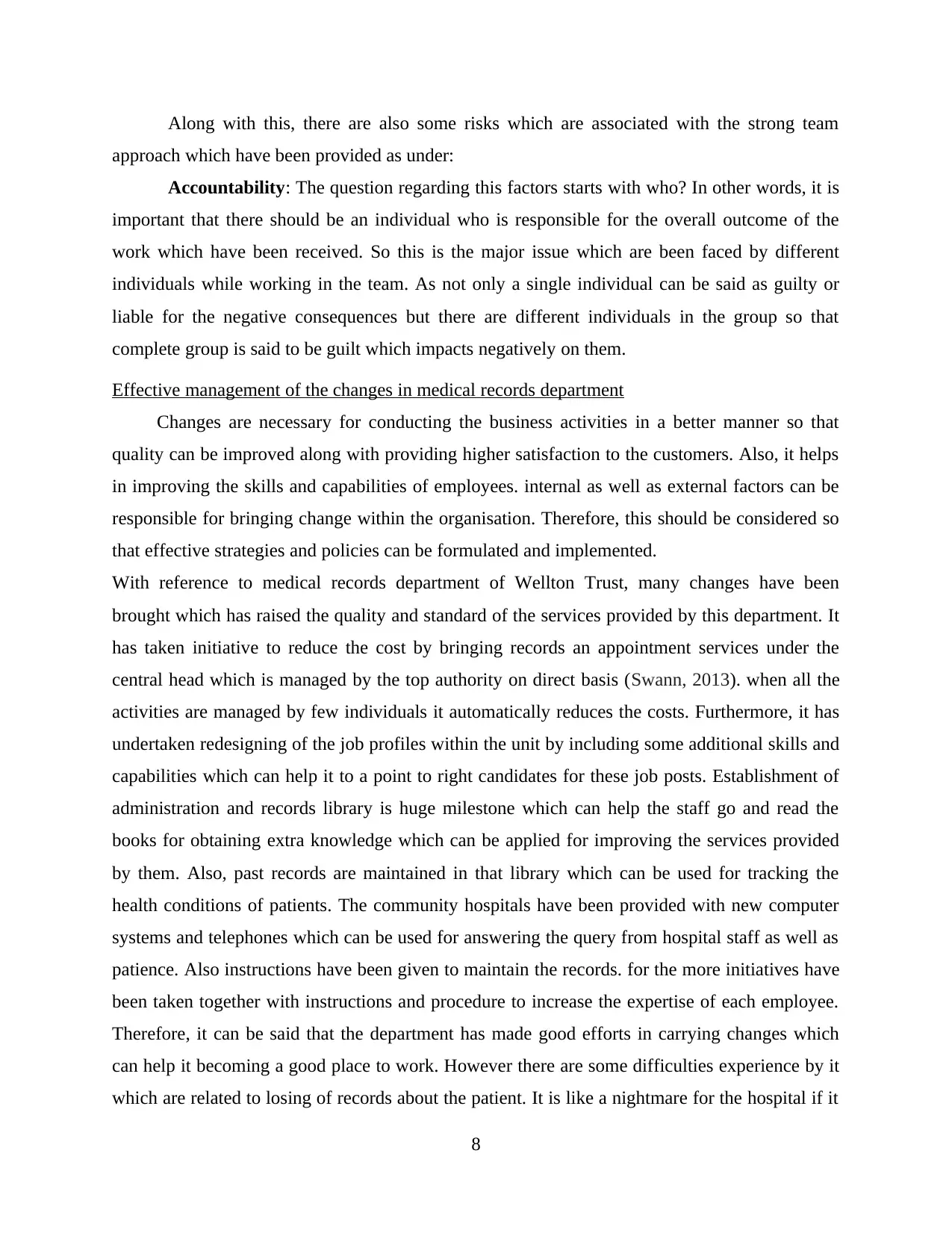
Along with this, there are also some risks which are associated with the strong team
approach which have been provided as under:
Accountability: The question regarding this factors starts with who? In other words, it is
important that there should be an individual who is responsible for the overall outcome of the
work which have been received. So this is the major issue which are been faced by different
individuals while working in the team. As not only a single individual can be said as guilty or
liable for the negative consequences but there are different individuals in the group so that
complete group is said to be guilt which impacts negatively on them.
Effective management of the changes in medical records department
Changes are necessary for conducting the business activities in a better manner so that
quality can be improved along with providing higher satisfaction to the customers. Also, it helps
in improving the skills and capabilities of employees. internal as well as external factors can be
responsible for bringing change within the organisation. Therefore, this should be considered so
that effective strategies and policies can be formulated and implemented.
With reference to medical records department of Wellton Trust, many changes have been
brought which has raised the quality and standard of the services provided by this department. It
has taken initiative to reduce the cost by bringing records an appointment services under the
central head which is managed by the top authority on direct basis (Swann, 2013). when all the
activities are managed by few individuals it automatically reduces the costs. Furthermore, it has
undertaken redesigning of the job profiles within the unit by including some additional skills and
capabilities which can help it to a point to right candidates for these job posts. Establishment of
administration and records library is huge milestone which can help the staff go and read the
books for obtaining extra knowledge which can be applied for improving the services provided
by them. Also, past records are maintained in that library which can be used for tracking the
health conditions of patients. The community hospitals have been provided with new computer
systems and telephones which can be used for answering the query from hospital staff as well as
patience. Also instructions have been given to maintain the records. for the more initiatives have
been taken together with instructions and procedure to increase the expertise of each employee.
Therefore, it can be said that the department has made good efforts in carrying changes which
can help it becoming a good place to work. However there are some difficulties experience by it
which are related to losing of records about the patient. It is like a nightmare for the hospital if it
8
approach which have been provided as under:
Accountability: The question regarding this factors starts with who? In other words, it is
important that there should be an individual who is responsible for the overall outcome of the
work which have been received. So this is the major issue which are been faced by different
individuals while working in the team. As not only a single individual can be said as guilty or
liable for the negative consequences but there are different individuals in the group so that
complete group is said to be guilt which impacts negatively on them.
Effective management of the changes in medical records department
Changes are necessary for conducting the business activities in a better manner so that
quality can be improved along with providing higher satisfaction to the customers. Also, it helps
in improving the skills and capabilities of employees. internal as well as external factors can be
responsible for bringing change within the organisation. Therefore, this should be considered so
that effective strategies and policies can be formulated and implemented.
With reference to medical records department of Wellton Trust, many changes have been
brought which has raised the quality and standard of the services provided by this department. It
has taken initiative to reduce the cost by bringing records an appointment services under the
central head which is managed by the top authority on direct basis (Swann, 2013). when all the
activities are managed by few individuals it automatically reduces the costs. Furthermore, it has
undertaken redesigning of the job profiles within the unit by including some additional skills and
capabilities which can help it to a point to right candidates for these job posts. Establishment of
administration and records library is huge milestone which can help the staff go and read the
books for obtaining extra knowledge which can be applied for improving the services provided
by them. Also, past records are maintained in that library which can be used for tracking the
health conditions of patients. The community hospitals have been provided with new computer
systems and telephones which can be used for answering the query from hospital staff as well as
patience. Also instructions have been given to maintain the records. for the more initiatives have
been taken together with instructions and procedure to increase the expertise of each employee.
Therefore, it can be said that the department has made good efforts in carrying changes which
can help it becoming a good place to work. However there are some difficulties experience by it
which are related to losing of records about the patient. It is like a nightmare for the hospital if it
8
Paraphrase This Document
Need a fresh take? Get an instant paraphrase of this document with our AI Paraphraser
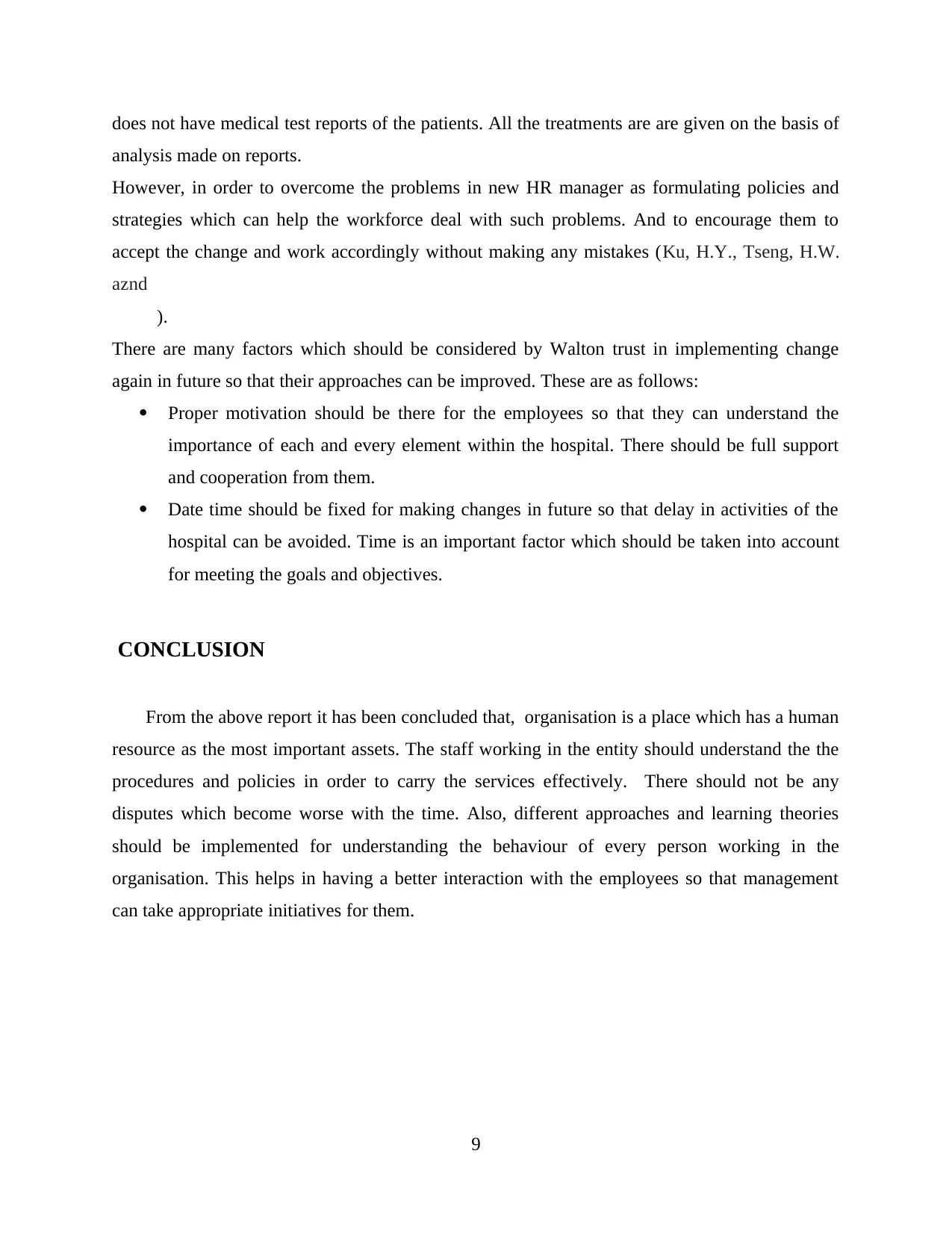
does not have medical test reports of the patients. All the treatments are are given on the basis of
analysis made on reports.
However, in order to overcome the problems in new HR manager as formulating policies and
strategies which can help the workforce deal with such problems. And to encourage them to
accept the change and work accordingly without making any mistakes (Ku, H.Y., Tseng, H.W.
aznd
).
There are many factors which should be considered by Walton trust in implementing change
again in future so that their approaches can be improved. These are as follows:
Proper motivation should be there for the employees so that they can understand the
importance of each and every element within the hospital. There should be full support
and cooperation from them.
Date time should be fixed for making changes in future so that delay in activities of the
hospital can be avoided. Time is an important factor which should be taken into account
for meeting the goals and objectives.
CONCLUSION
From the above report it has been concluded that, organisation is a place which has a human
resource as the most important assets. The staff working in the entity should understand the the
procedures and policies in order to carry the services effectively. There should not be any
disputes which become worse with the time. Also, different approaches and learning theories
should be implemented for understanding the behaviour of every person working in the
organisation. This helps in having a better interaction with the employees so that management
can take appropriate initiatives for them.
9
analysis made on reports.
However, in order to overcome the problems in new HR manager as formulating policies and
strategies which can help the workforce deal with such problems. And to encourage them to
accept the change and work accordingly without making any mistakes (Ku, H.Y., Tseng, H.W.
aznd
).
There are many factors which should be considered by Walton trust in implementing change
again in future so that their approaches can be improved. These are as follows:
Proper motivation should be there for the employees so that they can understand the
importance of each and every element within the hospital. There should be full support
and cooperation from them.
Date time should be fixed for making changes in future so that delay in activities of the
hospital can be avoided. Time is an important factor which should be taken into account
for meeting the goals and objectives.
CONCLUSION
From the above report it has been concluded that, organisation is a place which has a human
resource as the most important assets. The staff working in the entity should understand the the
procedures and policies in order to carry the services effectively. There should not be any
disputes which become worse with the time. Also, different approaches and learning theories
should be implemented for understanding the behaviour of every person working in the
organisation. This helps in having a better interaction with the employees so that management
can take appropriate initiatives for them.
9
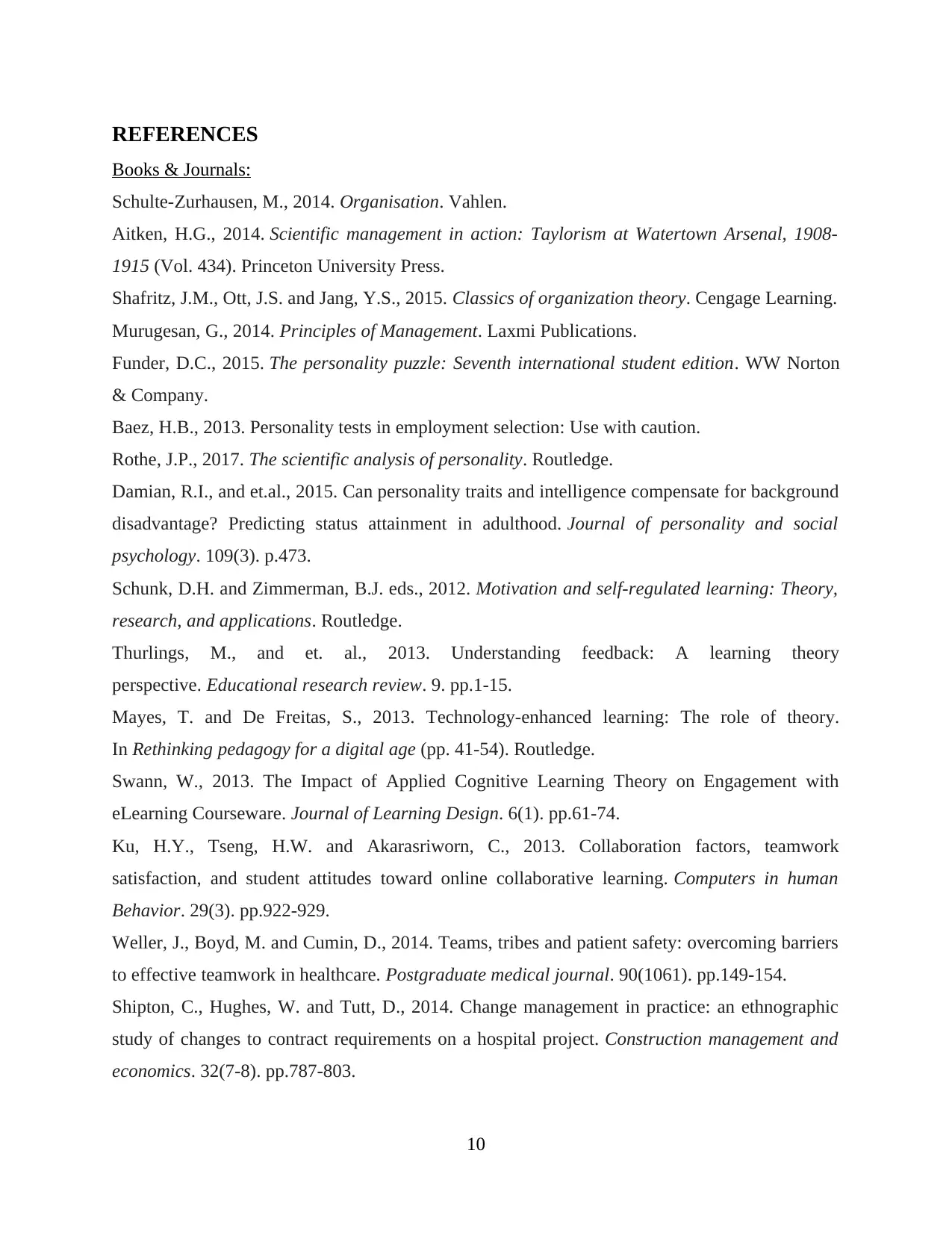
REFERENCES
Books & Journals:
Schulte-Zurhausen, M., 2014. Organisation. Vahlen.
Aitken, H.G., 2014. Scientific management in action: Taylorism at Watertown Arsenal, 1908-
1915 (Vol. 434). Princeton University Press.
Shafritz, J.M., Ott, J.S. and Jang, Y.S., 2015. Classics of organization theory. Cengage Learning.
Murugesan, G., 2014. Principles of Management. Laxmi Publications.
Funder, D.C., 2015. The personality puzzle: Seventh international student edition. WW Norton
& Company.
Baez, H.B., 2013. Personality tests in employment selection: Use with caution.
Rothe, J.P., 2017. The scientific analysis of personality. Routledge.
Damian, R.I., and et.al., 2015. Can personality traits and intelligence compensate for background
disadvantage? Predicting status attainment in adulthood. Journal of personality and social
psychology. 109(3). p.473.
Schunk, D.H. and Zimmerman, B.J. eds., 2012. Motivation and self-regulated learning: Theory,
research, and applications. Routledge.
Thurlings, M., and et. al., 2013. Understanding feedback: A learning theory
perspective. Educational research review. 9. pp.1-15.
Mayes, T. and De Freitas, S., 2013. Technology-enhanced learning: The role of theory.
In Rethinking pedagogy for a digital age (pp. 41-54). Routledge.
Swann, W., 2013. The Impact of Applied Cognitive Learning Theory on Engagement with
eLearning Courseware. Journal of Learning Design. 6(1). pp.61-74.
Ku, H.Y., Tseng, H.W. and Akarasriworn, C., 2013. Collaboration factors, teamwork
satisfaction, and student attitudes toward online collaborative learning. Computers in human
Behavior. 29(3). pp.922-929.
Weller, J., Boyd, M. and Cumin, D., 2014. Teams, tribes and patient safety: overcoming barriers
to effective teamwork in healthcare. Postgraduate medical journal. 90(1061). pp.149-154.
Shipton, C., Hughes, W. and Tutt, D., 2014. Change management in practice: an ethnographic
study of changes to contract requirements on a hospital project. Construction management and
economics. 32(7-8). pp.787-803.
10
Books & Journals:
Schulte-Zurhausen, M., 2014. Organisation. Vahlen.
Aitken, H.G., 2014. Scientific management in action: Taylorism at Watertown Arsenal, 1908-
1915 (Vol. 434). Princeton University Press.
Shafritz, J.M., Ott, J.S. and Jang, Y.S., 2015. Classics of organization theory. Cengage Learning.
Murugesan, G., 2014. Principles of Management. Laxmi Publications.
Funder, D.C., 2015. The personality puzzle: Seventh international student edition. WW Norton
& Company.
Baez, H.B., 2013. Personality tests in employment selection: Use with caution.
Rothe, J.P., 2017. The scientific analysis of personality. Routledge.
Damian, R.I., and et.al., 2015. Can personality traits and intelligence compensate for background
disadvantage? Predicting status attainment in adulthood. Journal of personality and social
psychology. 109(3). p.473.
Schunk, D.H. and Zimmerman, B.J. eds., 2012. Motivation and self-regulated learning: Theory,
research, and applications. Routledge.
Thurlings, M., and et. al., 2013. Understanding feedback: A learning theory
perspective. Educational research review. 9. pp.1-15.
Mayes, T. and De Freitas, S., 2013. Technology-enhanced learning: The role of theory.
In Rethinking pedagogy for a digital age (pp. 41-54). Routledge.
Swann, W., 2013. The Impact of Applied Cognitive Learning Theory on Engagement with
eLearning Courseware. Journal of Learning Design. 6(1). pp.61-74.
Ku, H.Y., Tseng, H.W. and Akarasriworn, C., 2013. Collaboration factors, teamwork
satisfaction, and student attitudes toward online collaborative learning. Computers in human
Behavior. 29(3). pp.922-929.
Weller, J., Boyd, M. and Cumin, D., 2014. Teams, tribes and patient safety: overcoming barriers
to effective teamwork in healthcare. Postgraduate medical journal. 90(1061). pp.149-154.
Shipton, C., Hughes, W. and Tutt, D., 2014. Change management in practice: an ethnographic
study of changes to contract requirements on a hospital project. Construction management and
economics. 32(7-8). pp.787-803.
10
⊘ This is a preview!⊘
Do you want full access?
Subscribe today to unlock all pages.

Trusted by 1+ million students worldwide
1 out of 14
Related Documents
Your All-in-One AI-Powered Toolkit for Academic Success.
+13062052269
info@desklib.com
Available 24*7 on WhatsApp / Email
![[object Object]](/_next/static/media/star-bottom.7253800d.svg)
Unlock your academic potential
Copyright © 2020–2026 A2Z Services. All Rights Reserved. Developed and managed by ZUCOL.





